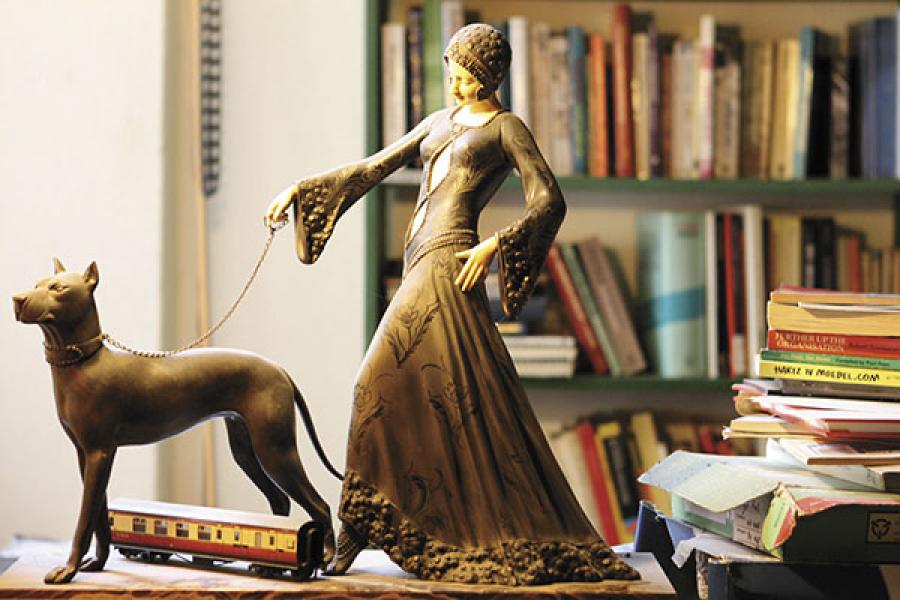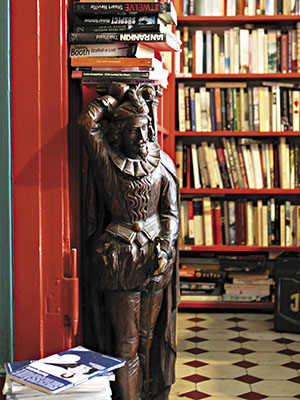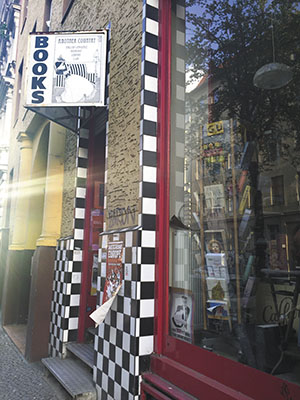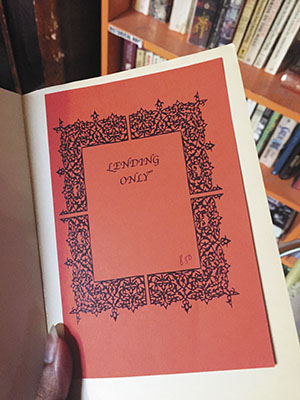
That other story in Berlin
A most unusual Berlin bookstore is making book lovers from far-flung corners of the world feel right at home in the city
Picture a book in your hands. It could be new and immaculate, with a hardcover and dust jacket, or a weather-worn, dog-eared old paperback. You spend a few seconds taking in the details on the cover. You glance at the spine, flip it over and take a quick look at the synopsis on the back. You finally turn it over again and just before you open the cover for the first time, in those brief seconds before you head through that little space-time portal, you experience a feeling that’s so hard to describe. It’s a mixture of anticipation combined with an impending sense of adventure as you’re about to embark on a journey that will take you into a whole other world. After all, a book cover is merely a door with unimaginable wonders on the other side.
It’s this strange sense of excitement that I had one sunny April afternoon in 2014 when I turned off the busy Zossener Strasse onto the quieter Riemannstrasse in Berlin’s Kreuzberg district. There, tucked away between two sandstone walls, was a short flight of stairs leading up to an unassuming red door, behind which, I’d been told, lay a treasure trove of books in a place that, while neither bright nor beautiful, was certainly weird and wonderful. I was about to enter Another Country, a Berlin bookstore that was really so much more.
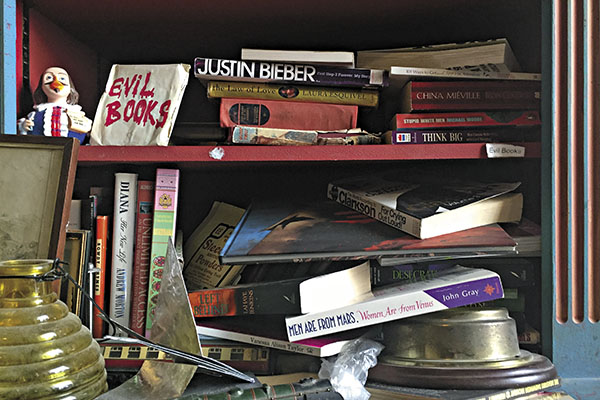
The shelves labelled ‘Evil Books’ are the only place where Another Country’s all-accepting nature gives way to some judgement
A little over a year and a half after that first trip to the shop, that’s even made it to Lonely Planet’s 2011 list of 10 best bookstores in the world (it was ranked sixth), I was still puzzling over the hold the place had on me. I remember thinking about it in the bookstore’s dimly-lit basement, which houses its Fantasy and Science Fiction section and also hosts its Friday Night Dinners. It was an October evening and given that Halloween was just around the corner, the level of strangeness in the place had understandably stepped up a notch or two. One young lady appeared to have been transformed into a cat of some sort. A gentleman with a painted eye-patch sauntered past, a half-empty bottle of beer dangling from his hand. Another lady in a pointy hat pushed her way through the crowd, heading for a second helping of home-cooked pork tenderloin and apple.
Surrounded by the laughter, music and plenty of shouting from people trying to be heard over the din, I was beginning to think that maybe I was the only one so strangely infatuated by the bookstore. And then I overheard the conversation that two bearded gentlemen to my right were having. It put everything into perspective.

The clock that ticks away in the background at many a dinner
Said Beard One to Beard Two: “I hear you’ve made a short film about the bookstore.”
Said Beard Two to Beard One: “Yeah man. There’s something about this place. It’s like there’s something going on here and you feel like you want to be a part of it, but you just don’t know how…”
Beard Two (I later found out his name was David Gordon, an Irishman who owns Curious Fox, another English language bookstore in Berlin) had perfectly summed up Another Country in one quick sentence. So how did this box of mysteries that is Another Country come into being?
Back in the 90s, an Englishman named Alan Raphaeline, having moved to Berlin, was looking for a place to house a collection of 20,000 or so books. He’d approached the owners of a bookstore and asked whether they’d like to have his collection. They were interested, until they found out that around 40 percent of the collection comprised Fantasy and Science Fiction. They then said something to the effect of how they were interested in loftier literature; Fantasy and Science Fiction had no place in their store. Not one to be cowed down by such dismissal, Raphaeline marched out of his apartment one morning, determined not to return until he’d found a piece of real estate that would house his own shop. As he walked past Riemannstrasse 7, he caught sight of a ‘For Rent’ sign. Thus it was, in 1999, that Another Country came into being.
It’s nearly 17 years since the shop opened. In this time, I’m told, not much has changed. While there is some order to the bookstore—the first room houses Fiction, arranged in alphabetical order, the second room houses the Crime, Detective, Travel and Children’s Books sections, while the basement is completely devoted to Fantasy and Science Fiction—there’s still chaos aplenty. There are books everywhere. Not only on the shelves and racks, but in boxes on the floor, on tables, under tables, on chairs, under chairs, on stools, on the floor itself, and atop a little wooden figurine which really looks like a man carrying the weight of all the world upon his shoulders and head.
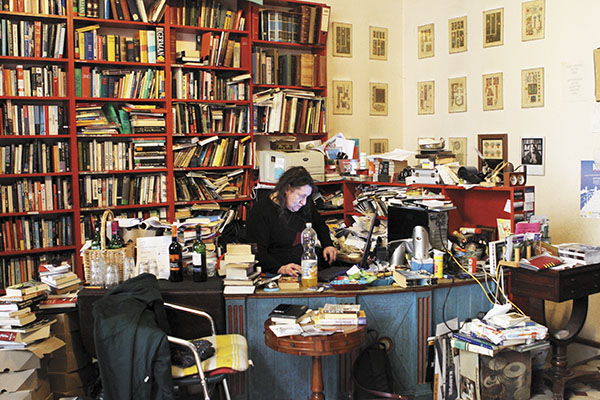
Another Country’s owner Sophia Raphaeline
There are wine glasses and beer bottles scattered all over the place. There are also strange artefacts tucked away in every nook and cranny. A pair of stuffed eagles oversee everything; a dressmaker’s mannequin with a WWII soldier’s hat on her head nestles in a corner; a Laughing Buddha has pride of place; a figurine of Lakshmi, the Hindu goddess of wealth, can be seen peeking out from a shelf; assorted vintage cookie jars and old-school milk cartons and tea-time memorabilia are strewn around. There’s even a glass jar that houses lost spectacles. It’s almost like the place is an old curiosity shop. And then, there’s 63-year-old Sophia Raphaeline herself, the bookstore’s acrostic poetry enthusiast of an owner.
Who is Sophia and what happened to Alan, you ask? Until he was in his mid-50s, Alan was a comfortably off, if somewhat eccentric, expat. Other than dabbling in a small but successful business, he’d spent his whole life reading. He averaged just under two books a day. Then, as a side effect to an existing medical condition, a hormonal imbalance was triggered in him. “I found that my body had started producing and using [the female hormone] oestrogen, instead of [the male hormone] testosterone,” Sophie, as she is now called, tells me. And thus, the inevitable transition.
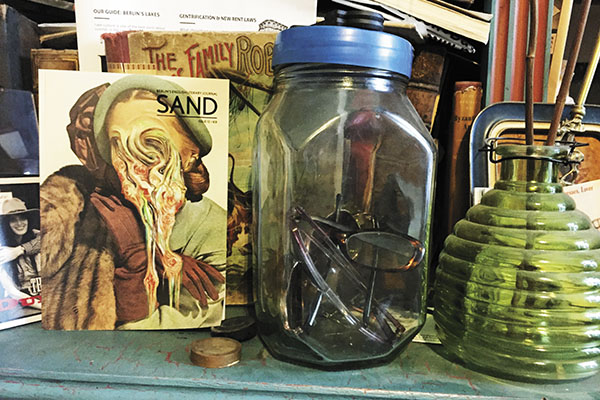
A glass jar that houses lost spectacles
But back to the books and bookstore. When Raphaeline was starting out, there were a large number of books he found that he couldn’t bear to part with permanently. All treasured parts of his collection, carefully gathered over the years. So he came up with a colour-coded labelling system that first and foremost made the price of the book evident to the customer, but also had room for the all-important ‘lending only’ tag on some books. While all books can be returned, the ‘lending only’ books simply must be returned. In both cases you only end up losing €1.50 (around Rs 115) of the price you pay when you take the book out of the store. Thus Raphaeline managed to have a collection of terrific books circulating among Berlin’s book lovers, while also having them—both the books and the book lovers—always coming back through the red doors for more.
What hadn’t been planned, though, was for the store to become what it did. It all just evolved. Amongst the chaos of the book-lined rooms, people found some sort of comfort. Perhaps it was that it seemed so little like a store, but more the home of an endearingly loopy, old aunt. Perhaps it was that the movie nights became weekly affairs, without a grand master plan to make them so, or that weekly dinners hosted for friends eventually turned into a bookstore community event. Perhaps it was also the fact that no one would laugh at you for wanting every single copy of… well, anything! Whether it was all of James Herriot’s veterinary escapades or the complete collection of Terry Pratchett’s Discworld Series or hard-bound copies of Nancy Drew and Hardy Boys. It was a far cry from the literary snobbery that peppers many bookstores. So what if you haven’t read Proust? Although if you want to, the store also has the complete In Search Of Lost Time.
It’s exactly this sentiment of inclusion that Viola Parra, from Italy, speaks of. Parra, then a Masters of English Literature student, spent six months in Berlin in 2014 interning at the bookstore. When I met her at Another Country’s Halloween dinner in 2015, she was only in Berlin for a few days, and was so happy to be back in that space that she loved. As the evening wore on, she became increasingly distressed that the clock was ticking, the needles approaching nearer and nearer midnight. “What I always liked the most about Another Country was the non-judgemental atmosphere and the free spirits of the visitors,” Viola had said to me. At another Friday Night Dinner, a gentleman sitting next to me spoke of how he’d wandered into the store one morning seven years ago, and had been coming back ever since. Julia Rose, who also pitches in and helps manage the store—which is non-profit and runs only with the army of volunteers Raphaeline has enlisted—also sauntered by over nine years ago for the first time. People never seem to leave.
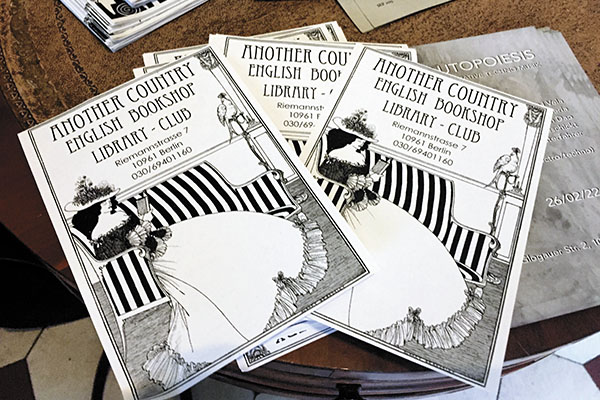
The store’s artsy address cards
But even in this all-accepting environment, there’s just one tiny little indulgence Raphaeline has allowed herself. “I considered a shelf with my favourite books, but then I realised that I wanted my favourite books out there, being read by everybody, not just sitting on a shelf,” she says. And so she came up with a novel idea. Two little shelves, with a small signboard in front of them that says ‘Evil Books’, are where the grim books that she doesn’t approve of repose. “There’s some foul stuff there,” she says to me, shoving aside a biography of Justin Bieber, and pulling out a copy of terrible poetry and handing it to me to read. She seems satisfied with how openly aghast I am at what I’ve just been subjected to.
I’ve been sitting with Raphaeline, listening to her speak to me of books, her relationship with them, and even her transition from the bearded and authoritative Alan (the change began in 2008), whose recommendations people would simply take as a divine law, to the woman that she is today. She speaks of the new bookstore that she’s opening in Berlin’s Willmanndamm—Another Country West—that will be a space for events, poetry readings and more community-based adventure. A space that she owns and hopes will continue to run long after she’s gone. I realise that just as the bookstore has evolved, and just as Raphaeline has evolved, so too have the roles that both play in the lives of so many people.

A figurine of goddess Lakshmi
Sophie, today, is more of an inspiration than Alan ever was. She’s someone successful, who has created a space where so very many people feel at home. Not just book lovers and Anglophiles, not just writers and artists, not just poets and itinerant bards, not just city-hopping tourists and earnest university students armed with lists of books they must read, but also the LGBT and trans communities as well as the vast populace of outsiders trying to make a home in Berlin. And for absolutely anyone who has ever
been “othered”.
It’s while we’re talking about books that had a massive impact on us as children that I really see Raphaeline light up. First, when she’s talking of Thomas Mann’s Magic Mountain, a book that she really loved as a child. “I read that and I thought to myself ‘Now that’s how a book should be written!’”
Then I tell her of a series (not just a book, mind you) that I grew up loving—Lyman Frank Baum’s Wizard of Oz series. “Have you read Wicked?” she asks me, looking rather excited. I shake my head, no. “Oooh!” she laughs, clapping her hands in delight, telling me that I must read it at once. So I get my hands on the first copy of the series almost immediately. And it turns out that her recommendation helps put everything that I’ve been thinking about, with regard to this most puzzling bookstore, into even more perspective.
You see, Wicked is the retelling of the Wizard of Oz through the eyes of the Wicked Witch of the West. It tells us the other story. The story that we so often miss. The story of the othered, if you will. And it makes us conscious that there’s always more than one narrative.
Raphaeline’s story, then, is that of those who thought they had seen all that life had to offer, until the universe dealt a strange hand that allowed them to see things through a completely different set of eyes.
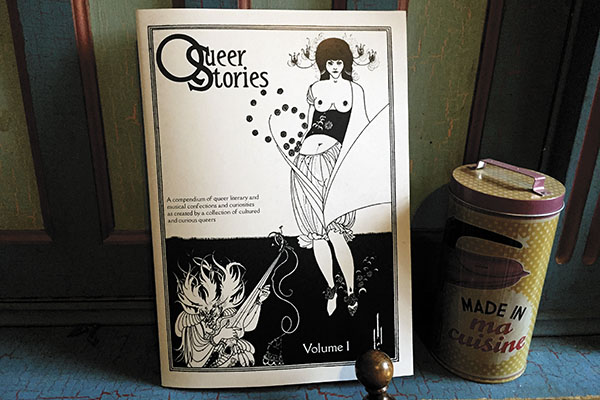
Queer Stories, a collection of literature from the LGBT community, spawned from meetings and readings at the store
One person, one life, two very different narratives. And this strange bookstore’s story is a tale of a shop completely the opposite of squeaky clean chains, with rows and rows of gleaming titles, and bored store clerks who very likely don’t read.
It tells, instead, the story of a messy world of words and colliding ideas. A space that has so much to offer the passerby, that it wins them over and converts them into bookstore regulars. It’s this almost magical, yet inexplicable, power of Another Country that I ponder over as I walk out of those red doors
that day.
As I cross the threshold, I’m reminded of something Viola once said. “Another Country makes you see things differently…”
(This story appears in the July-Aug 2016 issue of ForbesLife India. To visit our Archives, click here.)
